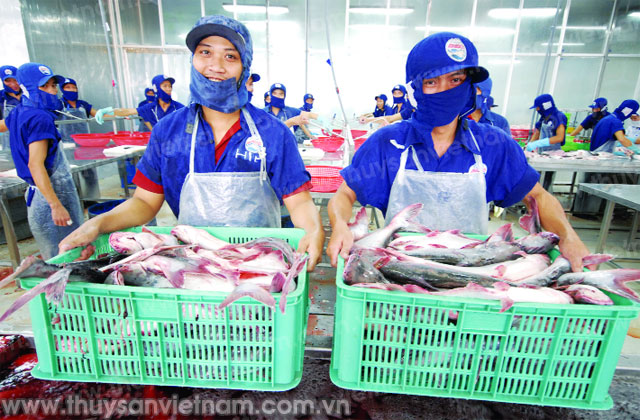If the State does not have timely intervention, this year Tra fish industry will likely be unable to escape from the ongoing difficult situation.
Why does Tra industry nose dive?
Director of Dong Thap Agriculture and Rural Department Department Duong Nghia Quoc said: “The lack of capital is the most difficulty facing Tra fish raisers and processing and export businesses. Almost all people who want to borrow more money from banks cannot meet conditions set by banks as they set the condition that borrowers must have proverty as mortgage and pay off all of their old debts.”
According to the director, that the banks value fish raising ponds based on prices of agricultural land is unreasonable. Besides, fish raisers and businesses are just lent an amount of money equivalent to 50% of the value of their mortgaged property, usually some hundreds million VND. The capital is not enough to buy feed. As a result, raisers have to borrow money from sources outside the banks with very high interest rates. Additionally, it usually costs 7 – 8 billion VND to feed an hectare of fish in 7 – 8 months. Meanwhile, banks require that farmers or businesses have to pay them back after 6 – 7 months. It is not yet reasonable. For many farmers, they also have to face one more difficulty, which is the late payment (2 – 3 months) from businesses who buy their fish.

Possibly, the whole industry would follow the old track, like in 2012 – Photo: Le Hoang Vu
Tran Thanh Hai, Head of Can Tho Fisheries Branch Office, said: “In the recent time, Tra industry continuously faces difficulties relating to prices, capital and consumption markets. The too loose link between parties involved in the industry and the very weak management are the reason why the Tra raising job nose dive. Anyone who wants to raise the fish can do it as long as they have capital. This leads to the continuous changes of fish raising areas. Many businesses dump their fish or take unfair competition. But nobody reprimanded them and no sanction was imposed.”
Locomotive needed
Le Van Tam (Dinh An Commune, Lap Vo District, Dong Thap), who has 6,500 m2 of pond for fish raising, said: “Learning that the government has a policy of providing loans with low interest rates for fish raisers, we are very happy. But in fact, we could not approach the loans because earlier I had already mortgaged all my property to borrow money from banks with an annual interest rate of 13%. The capital I borrowed was just some hundreds million VND, which was not sufficient. In the past crops, I suffered continuous losses and could not borrow more money, so I have to “suspend” my pond for several months. Three members of my family now have to raise fish for companies.”
To help raisers overcome these difficulties, the relevant agencies should help fish raising households link with each other apart from providing capital assistance, according to Quoc. The State, he stressed, must be “the locomotive” to help associate them with businesses.
According to Nguyen Ngoc Hai, Deputy Chairman of the Can Tho Fisheries Association and Direcor of Thoi An Co-operative (Can Tho), prices of the fish had declined continuously over the past years, making more and more farmers give up the fish and switch to raising other species. Previously, the co-operative had 20 – 25 ha raising Tra, exporting thousands of tonnes of fish annually. Over several years, input costs and bank interest rates rose strongly while prices of the fish went down, even below the production costs, causing losses for raisers. At present, the co-operative has only 5 hectares raising fish under contracts with companies. If the co-operative had not signed the contracts, it would have left their ponds empty for nearly half a year. In order to help the Tra industry come back to the golden age of 2007 – 2009, the government should invest or provide preferential loans for farmers and businesses.
|
|